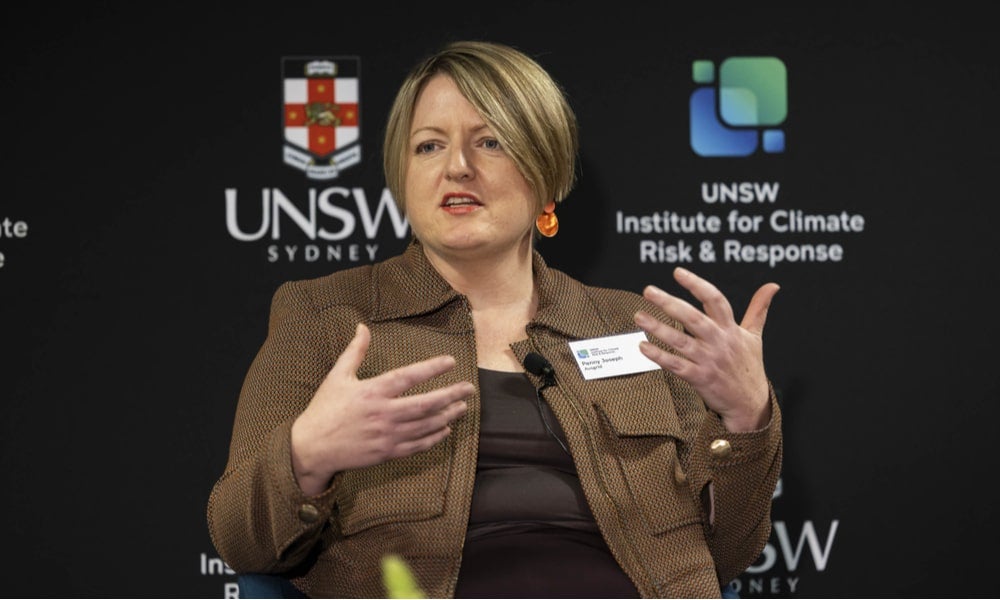Climate mitigation and resilience: essential skills for future leaders
Download The Business Of podcast on your favourite podcast platform.
What skills are required to build climate resilience in organisations and meet the challenges of climate change in the future of work?
All jobs of the future will have an element of climate mitigation across the STEM disciplines and beyond as the need to halt the impacts of climate change becomes an integral part of business, according to Penny Joseph, Director of Climate Resilience at major electricity distributor Ausgrid.
Speaking exclusively to The Business Of, a podcast from UNSW Business School, Ms Joseph provided insights into how the energy sector is adapting to climate change, offered lessons for workplace leaders on unifying diverse teams and explained what future skills will be required for organisations to address the impact of climate change across their operations.
While her job title did not exist a few years ago, Ms Joseph believes it will one day be standard practice. “I expect that everybody will have climate resilience and climate mitigation as part of their roles. Everyone will be playing a part if they’re not already,” she said.
“Resilience means we’ve thought through the risks of the future and have strategies in place to be prepared for that. But resilience is also being prepared for things you might not know about or might not expect to happen.”
Read more: Three climate risk challenges (and solutions) for industry
Changing skills and shifting careers
Ms Joseph is an engineer with an MBA who previously worked in transformational roles in the aerospace and solar industries. She sees her diverse background as a strength that enables her to work through problems holistically.
“When I first started working in the climate science space, I thought that I needed to have a PhD in science to be able to do my type of role,” she said.
“Coming forward a few years, I have more respect than ever for the scientists, but I also understand that there is value in understanding the business problem – [such as] how to manage a network of infrastructure,” she says, adding that her unique perspective is a strength in the role.
Ms Joseph’s comments were made on the new series of The Business Of, a podcast from AGSM @ UNSW Business School exploring the role businesses and industry leaders play in the fight against climate change.

She told host Dr Juliet Bourke, a Professor of Practice in the School of Management & Governance at UNSW Business School, that her work includes talking to people in vulnerable communities, climate experts, and those within the energy industry. Not everyone shares her views – and that’s by design.
“I have people that influence my thinking that might even be climate change deniers. Because you understand, why are you thinking that way? What makes you think that way? And it helps you understand the problems from all different kinds of perspectives,” she said.
Focusing on climate solutions
Finding solutions to climate change is a complex task. Ms Joseph stressed that like any goal, it can be achieved by breaking it down into smaller, achievable parts.
“Sometimes you’re not necessarily trying to solve the problem completely, but just to move it forward," she said.
She said gathering and understanding evidence, such as heat data, can help you articulate your potential impact, and “create a much better economic case for being able to move the dial”.
Subscribe to BusinessThink for the latest research, analysis and insights from UNSW Business School
“It is hard, because often you need to make decisions in a timeframe where you haven’t received all the data. I think the best leaders are making good decisions with incomplete information,” she told Dr Bourke. “I don’t know whether failing is the enemy here, or whether it’s doing nothing. If you do nothing, that’s also a problem. And that’s not going to be good enough for the future.”
“It’s clear from Penny’s experience that climate change mitigation is a key skill for leaders of tomorrow – and not yet something you can learn in an MBA,” said Dr Bourke. “Hearing about the skill mix she’s acquired and her capacity to bring together varied expertise is a fascinating insight into the future of work.”
